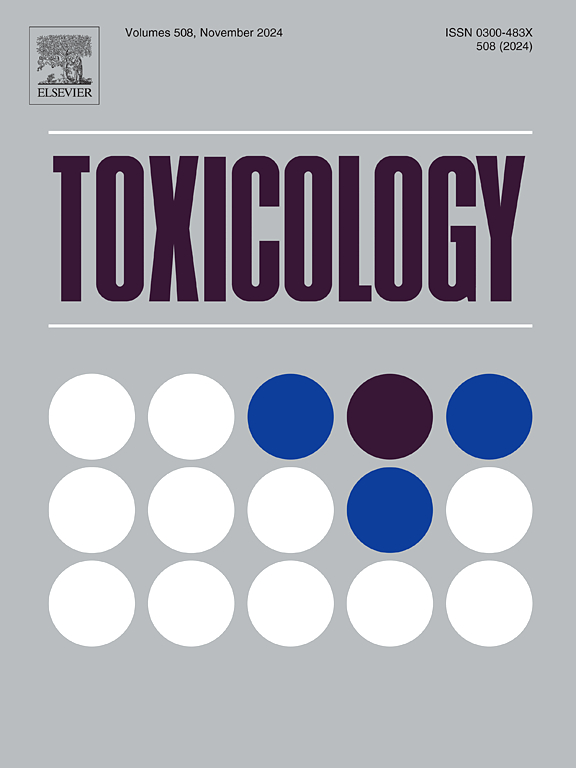肠道类器官中血清素稳态的破坏为药物诱导的胃肠道毒性提供了见解。
IF 4.8
3区 医学
Q1 PHARMACOLOGY & PHARMACY
引用次数: 0
摘要
药物引起的胃肠道毒性是一种常见的临床不良事件,需要仔细监测和管理以确保患者的依从性。虽然药物胃肠道毒性的临床前评估主要依赖于动物实验,但肠道类器官在体外鉴定胃肠道毒性方面受到越来越多的关注。尽管如此,目前的体外方案主要评估药物引起的结构改变,而胃肠道不良事件通常源于功能紊乱。胃肠道中血清素信号的破坏与运动障碍以及恶心和呕吐有关。我们的目的是研究来自犬小肠的类器官中血清素稳态的改变作为药物诱导胃肠道毒性的驱动因素。用一种化合物(NVS-1)和三种已知的临床前和临床胃肠道不良反应的酪氨酸激酶抑制剂(阿法替尼、克里唑替尼和凡德替尼)治疗类器官,导致上清血清素水平升高。机制分析表明,NVS-1和阿法替尼刺激血清素释放,而克唑替尼和万德替尼通过直接抑制血清素再摄取转运体抑制血清素再摄取。使用数据挖掘方法,我们进一步提出抑制5 -羟色胺再摄取可能有助于多种上市药物观察到的胃肠道毒性。总之,我们提出了一种新的体外胃肠道毒性终点的实现,可以补充现有的方法,并作为药物诱导胃肠道毒性的机制和预测/筛选工具。本文章由计算机程序翻译,如有差异,请以英文原文为准。
Disruption of serotonin homeostasis in intestinal organoids provides insights into drug-induced gastrointestinal toxicity
Drug-induced gastrointestinal toxicity is a frequent clinical adverse event that needs to be carefully monitored and managed to ensure patient compliance. While preclinical assessment of drug-induced gastrointestinal toxicity mostly relies on animal experimentation, intestinal organoids have gained increasing attention to identify gastrointestinal toxicants in vitro. Nonetheless, current in vitro protocols primarily assess structural alterations induced by drugs, whereas gastrointestinal adverse events can often stem from functional disturbances. Disruption of serotonin signaling in the gastrointestinal tract is associated with impaired motility, as well as nausea and vomiting. We aimed to investigate alterations of serotonin homeostasis in organoids derived from the canine small intestine as a driver of drug-induced gastrointestinal toxicity. Treatment of the organoids with a compound (NVS-1) inducing acute gastrointestinal toxicity in dogs as well as with three tyrosine kinase inhibitors with known preclinical and clinical gastrointestinal adverse effects (afatinib, crizotinib and vandetanib) led to increased supernatant serotonin levels. Mechanistic assays showed that, while NVS-1 and afatinib stimulate serotonin release, crizotinib and vandetanib inhibit serotonin re-uptake via direct inhibition of the serotonin re-uptake transporter. Using a data mining approach, we further suggest that inhibition of serotonin re-uptake could contribute to gastrointestinal toxicity observed with multiple marketed drugs. In conclusion, we present the implementation of a novel in vitro gastrointestinal toxicity endpoint that could complement current methods and serve as a mechanistic and predictive/screening tool for drug-induced gastrointestinal toxicity.
求助全文
通过发布文献求助,成功后即可免费获取论文全文。
去求助
来源期刊

Toxicology
医学-毒理学
CiteScore
7.80
自引率
4.40%
发文量
222
审稿时长
23 days
期刊介绍:
Toxicology is an international, peer-reviewed journal that publishes only the highest quality original scientific research and critical reviews describing hypothesis-based investigations into mechanisms of toxicity associated with exposures to xenobiotic chemicals, particularly as it relates to human health. In this respect "mechanisms" is defined on both the macro (e.g. physiological, biological, kinetic, species, sex, etc.) and molecular (genomic, transcriptomic, metabolic, etc.) scale. Emphasis is placed on findings that identify novel hazards and that can be extrapolated to exposures and mechanisms that are relevant to estimating human risk. Toxicology also publishes brief communications, personal commentaries and opinion articles, as well as concise expert reviews on contemporary topics. All research and review articles published in Toxicology are subject to rigorous peer review. Authors are asked to contact the Editor-in-Chief prior to submitting review articles or commentaries for consideration for publication in Toxicology.
 求助内容:
求助内容: 应助结果提醒方式:
应助结果提醒方式:


